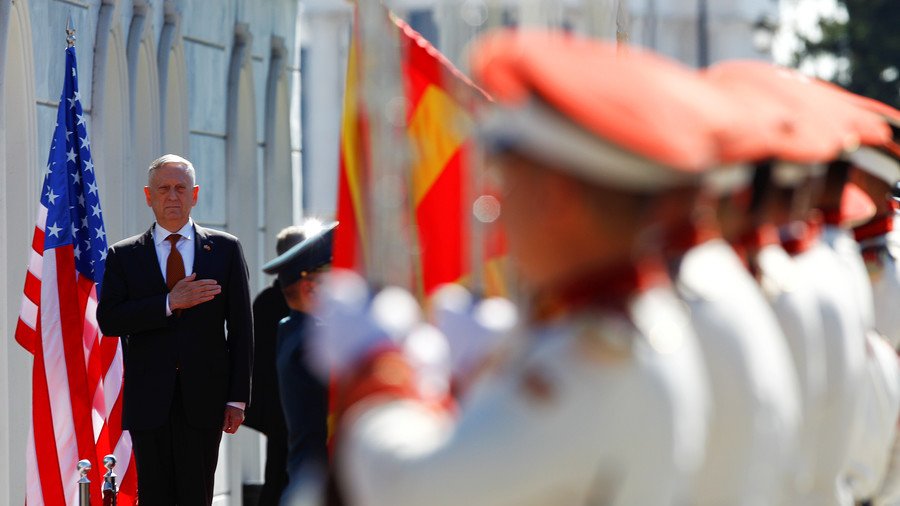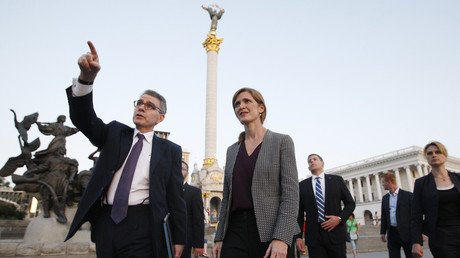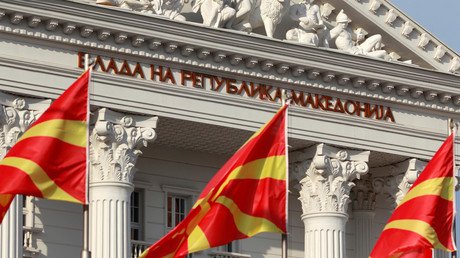Western leaders descend on Macedonian 'battleground' as Moscow pulls its punches

Outside of the Balkans, Macedonia is a country rarely on the radar. Yet, this month, its two million people are at the center of an illusory tug-of-war.
As September destinations go, it has plenty of appeal. Daytime temperatures are between 27 and 30 degrees Celsius (80-86 Fahrenheit), nights are balmy and there's plenty of sunshine. Nevertheless, Skopje has never been a noted early autumn stopping point for Westerners. Until this year.
In the past week alone, a procession of luminaries has touched down in the Macedonian capital, including German Foreign Minister Heiko Maas, US Defence Secretary James Mattis and his Italian counterpart Elisabetta Trenta plus the European Union foreign policy chief Federica Mogherini. Meanwhile, earlier this month, NATO Secretary General Jens Stoltenberg, Austrian Chancellor Sebastian Kurz and Angela Merkel also dropped into town. The latter's jaunt marking the first ever official visit by a German chancellor. These are big fish, representing a considerable amount of political heft. And none of them travelled to check out Skopje's Old Bazaar. Instead, the reason for this sudden enthusiasm boils down to the latest attempt to extend NATO and EU influence in Eastern Europe. And Macedonia is one of the few remaining "prizes" in "National Endowment for Democracy"speak.
Big ballot
On September 30, the landlocked ex-Yugoslav republic holds a referendum on whether to change the name of the country, from plain-old "Macedonia" to "North Macedonia." A transformation which amounts to locals renouncing their connection to the ancient Macedonians (such as Alexander the Great, among others) and acquiescing to the neighboring Greeks, who have vetoed Skopje's accession to various Western institutions since it broke away from Belgrade, over a quarter of a century ago. Athens believes the current definition possibly gives Skopje a claim to some of its territory and historical traditions.
Aware of sensitivities over the whole name issue, the government has decided to make the question broader. Thus, it's gone for the jugular: "Do you support EU and NATO membership by accepting the agreement between Macedonia and Greece?" A move the opposition regards as cynical.
In the "Yes" camp is Prime Minister Zoran Zaev and his ruling coalition. And they are supported by much of the local mainstream media and the numerous Brussels and Washington-funded NGOs working there. The "No" side is led by Hristijan Mickoski's nationalists who regard the Zaev-Alexis Tsipras accord as an act of treason. However, the movement still wants to join the EU and NATO, but under the state's current title.
The other naysayers, Janko Bacev's United Macedonia party, are opposed to Western integration and in favour stronger ties with Moscow. Yet, despite these intentions, the Kremlin hasn't exactly circled the wagons to offer support. So far, the most notable backer he's attracted from Russia is Alexander Dugin, an academic fired from his last teaching post at Moscow State University in 2014, who doesn't appear to have secured meaningful employment since. Indeed, Dugin is arguably better known in the West where media outlets use his image, or a caricature of it, as a bogeyman. Think Rasputin, if Rasputin never had access to Tsar Nikolai's family, and couldn't even get a gig in St Petersburg.
Problems with projection
During his visit this week, Mattis accused Moscow of meddling in the campaign. He presented no evidence, but stated: "(there is) no doubt that they (the Russians) have transferred money and they are also conducting broader influence campaigns." For its part, the Kremlin rubbished the notion of interference, although it does strongly oppose Skopje's NATO ambitions.
Step back a moment and note Mattis' comments about "influence campaigns." Because the sudden rush of leading politicians from Washington, Brussels, Rome, Vienna and Berlin amounts to a persuasion crusade which Moscow couldn't match even if it somehow managed to resurrect Yuri Gagarin and had him conduct a flyover of Skopje.
Right now, Western elites, for whatever reason, seem determined to "win" Macedonia and are heavily invested. And Russia's exasperated officials simply can't compete. "We see conscious and purposeful information campaigns, forcing Russophobic hysteria and intimidating people with the 'Russian threat,' in order to achieve specific domestic and foreign policy goals," complained Moscow's ambassador, Oleg Shcherbak, last month.
Sources in the Kremlin seem pretty nonplussed by Macedonia's choice. "To be honest, Macedonia and Montenegro (which joined NATO last year) don't really matter, outside of the effect their relationship with Washington might have on Serbia," an insider says. "This can work two ways, it can make Serbs afraid of being isolated in the Balkans or it can make them doubly determined to keep their independence and their friendship with Russia. The jury is out on what will happen."
According to opinion polls, the "yes" side will carry the referendum. A US-funded survey puts the margin at 49 percent-22 percent and a local equivalent calls it as 41 percent-35 percent.
With Moscow's attention increasingly focused on Asia, and its resistance to NATO expansion concentrated on borderlands such as Ukraine and Georgia, whether Macedonia remains independent, under its current name, or joins NATO and the EU as North Macedonia isn't something where it has much leverage. That said, the Kremlin's Western rivals appear to be heavily invested in shaping the outcome they desire.
Think your friends would be interested? Share this story!
The statements, views and opinions expressed in this column are solely those of the author and do not necessarily represent those of RT.
















